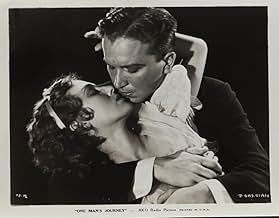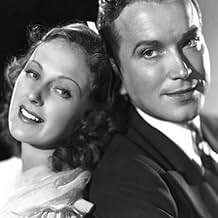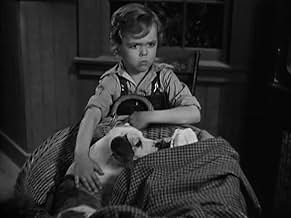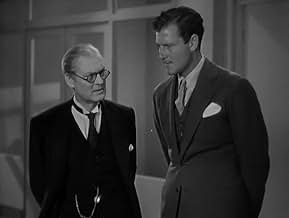Aggiungi una trama nella tua linguaWidower Dr. Watt moves to a small town, raising son Jimmy and abandoned Letty. Despite aspirations for research, epidemic, family needs hinder his goals. Years later, he realizes his life wa... Leggi tuttoWidower Dr. Watt moves to a small town, raising son Jimmy and abandoned Letty. Despite aspirations for research, epidemic, family needs hinder his goals. Years later, he realizes his life wasn't a failure.Widower Dr. Watt moves to a small town, raising son Jimmy and abandoned Letty. Despite aspirations for research, epidemic, family needs hinder his goals. Years later, he realizes his life wasn't a failure.
- Regia
- Sceneggiatura
- Star
- Premi
- 3 vittorie totali
Samuel S. Hinds
- Dr. Babcock
- (as Sam Hinds)
Frank Ball
- Townsman
- (non citato nei titoli originali)
Dorothy Gray
- Letty's Daughter
- (non citato nei titoli originali)
John Ince
- Dr. James Carson
- (non citato nei titoli originali)
Lloyd Ingraham
- Townsman at Farewell Meeting
- (non citato nei titoli originali)
Dave O'Brien
- Dance Extra
- (non citato nei titoli originali)
Recensioni in evidenza
This is one of the "lost but found" films shown on TCM on 4/4/07. Apparently this and two other films shown that night were held out of public release due to litigation concerning royalties and now the powers that be at Turner Classic Movies have taken care of the licensing issues. Of the three films shown that night, none of them were great treasures but all three were excellent--very solid examples of the type of films RKO made during the era. Normally, when you think of RKO in 1933, you think KING KONG or Astaire and Rogers as a team, but there were other good films that might rank just below them in quality and entertainment.
This film is rather reminiscent of several other doctor dramas from the era (such as THE CITADEL and ARROWSMITH) where the doctor's nobility and sacrifice are celebrated. A younger Lionel Barrymore (sporting a dark doo thanks to hair dye) comes to a rural area to set up a medical practice. However, at first, he is unsuccessful and only begins to get patients when he agrees to use the barter system. Because of this, he is constantly in financial straits, but because he is so noble and decent, he doesn't give up and is eventually accepted and loved by the community. While all this could have been VERY syrupy, thanks to good writing and a terrific performance by Barrymore it is not.
There is certainly a lot more to the movie than this--including an excellent (as usual) performance by May Robson and an early performance by Joel McCrea. See this film and see a "small" film that really packs an excellent punch.
This film is rather reminiscent of several other doctor dramas from the era (such as THE CITADEL and ARROWSMITH) where the doctor's nobility and sacrifice are celebrated. A younger Lionel Barrymore (sporting a dark doo thanks to hair dye) comes to a rural area to set up a medical practice. However, at first, he is unsuccessful and only begins to get patients when he agrees to use the barter system. Because of this, he is constantly in financial straits, but because he is so noble and decent, he doesn't give up and is eventually accepted and loved by the community. While all this could have been VERY syrupy, thanks to good writing and a terrific performance by Barrymore it is not.
There is certainly a lot more to the movie than this--including an excellent (as usual) performance by May Robson and an early performance by Joel McCrea. See this film and see a "small" film that really packs an excellent punch.
Soap opera spanning from the horse and buggy through to the current day, 1933, following the career of Eli Watt (played by Lionel Barrymore), a widower who has come back to his rural hometown where he fixes up "the old place" and sets himself up as town doctor (and mostly gets paid by the locals with sacks of potatoes). On his very first doctoring job, a mother giving birth dies, the angry, heartbroken dad wants nothing to do with his new baby daughter, so Doctor takes the baby home to raise along with his own young son. After four years the angry dad now regrets his decision and takes the girl back - then the years progress as Eli's son grows up and is training to be a doctor himself, and Eli becomes a hero during a local smallpox epidemic.
This is a warmhearted, interesting film boosted up by a very well done performance given by Lionel Barrymore who plays the kindly doctor with a lot of charm. May Robson is appealing here playing a plucky local woman who comes to live with the doctor and help care for the household and baby alike. Joel McCrea also appears in this as the doctor's son - he gives a nice performance but isn't really given that much to do. All in all, a quite entertaining film.
This is a warmhearted, interesting film boosted up by a very well done performance given by Lionel Barrymore who plays the kindly doctor with a lot of charm. May Robson is appealing here playing a plucky local woman who comes to live with the doctor and help care for the household and baby alike. Joel McCrea also appears in this as the doctor's son - he gives a nice performance but isn't really given that much to do. All in all, a quite entertaining film.
It's strange to see the similarities in this film and "It's A Wonderful Life" from 13 years later. Barrymore plays a country doctor, Eli Watt, who has failed at a bigger practice, has become a widower, and now returns to his small town along with his small son to set up practice on his on. His first case has a horrible outcome, although it is not the doctor's fault. A farmer's wife dies in childbirth and the farmer (David Landau) does not want the baby girl and says he will get the poor farm to come and get her. Dr. Watt takes the baby girl in as his own and raises her as his daughter, Letty. In one plot turn I could not figure out, Mae Robson appears out of nowhere and says her life is empty and figures it can be fuller by keeping house for the doctor and his family.
The film is rather melodramatic, but the great acting of Barrymore and company make it worth your while, as the good doctor gets paid rarely in money and more often in potatoes, handles epidemics, and his son Bill grows up to be...Joel McCrea! (Bill Watt as a young man). Eli has always dreamed of specializing and even traveling to Europe to study with some of the great doctors, so he can bring what he has learned back to his community. However, time after time some emergency, Bill's tuition for medical school, plus just the plain old passage of time delays that dream until finally, old age finds Eli Watt, and he resigns himself to his fate, although with contentment rather than the anger and bitterness of George Bailey.
Will anyone ever notice his sacrifice and all he has done for the town? Watch and find out. It's a sentimental journey, but worth watching.
Other odd coincidences between this film and It's A Wonderful Life - one of the characters that Dr. Watt crosses paths and locks horns with over the years is a rich banker who thinks money can fix everything and therefore everybody wants his money - much like Barrymore's character in IAWL. Also, one imminent physician who respects country doctor Eli Watt and his accomplishments and sacrifice is played by Samuel S. Hinds, who played Pa Bailey in IAWL.
One thing that came out of nowhere for me and seemed a bit silly too, and doesn't have anything to do with the plot, so I will talk about it. When Dr. Watt first shows up and Sarah (May Robson) becomes the Watt housekeeper, she looks about 20 years older than Dr. Watt - and May Robson was in fact 20 years older than Lionel Barrymore. At the end of the film Dr. Watt has aged twenty years, and Sarah looks the same, to the point that she proposes marriage and he gives one of the most unromantic acceptances in the history of the world.
Films did give quite a few age un-appropriate roles to May Robson - she was 75 when this movie was made. I guess her great energy just makes you forget her age most of the time.
The film is rather melodramatic, but the great acting of Barrymore and company make it worth your while, as the good doctor gets paid rarely in money and more often in potatoes, handles epidemics, and his son Bill grows up to be...Joel McCrea! (Bill Watt as a young man). Eli has always dreamed of specializing and even traveling to Europe to study with some of the great doctors, so he can bring what he has learned back to his community. However, time after time some emergency, Bill's tuition for medical school, plus just the plain old passage of time delays that dream until finally, old age finds Eli Watt, and he resigns himself to his fate, although with contentment rather than the anger and bitterness of George Bailey.
Will anyone ever notice his sacrifice and all he has done for the town? Watch and find out. It's a sentimental journey, but worth watching.
Other odd coincidences between this film and It's A Wonderful Life - one of the characters that Dr. Watt crosses paths and locks horns with over the years is a rich banker who thinks money can fix everything and therefore everybody wants his money - much like Barrymore's character in IAWL. Also, one imminent physician who respects country doctor Eli Watt and his accomplishments and sacrifice is played by Samuel S. Hinds, who played Pa Bailey in IAWL.
One thing that came out of nowhere for me and seemed a bit silly too, and doesn't have anything to do with the plot, so I will talk about it. When Dr. Watt first shows up and Sarah (May Robson) becomes the Watt housekeeper, she looks about 20 years older than Dr. Watt - and May Robson was in fact 20 years older than Lionel Barrymore. At the end of the film Dr. Watt has aged twenty years, and Sarah looks the same, to the point that she proposes marriage and he gives one of the most unromantic acceptances in the history of the world.
Films did give quite a few age un-appropriate roles to May Robson - she was 75 when this movie was made. I guess her great energy just makes you forget her age most of the time.
One Man's Journey is the sentimental filmed tale of the life of a country doctor as played by Lionel Barrymore. It's a nice, but very dated story, doctors like Barrymore are sadly a thing of the past.
Barrymore arrives back in his hometown, a widower with a small son who later grows up to be Joel McCrea and follows in his father's footsteps as a physician. In fact he starts off on the wrong foot by losing the mother during a difficult pregnancy. The daughter from that pregnancy grows up to be Dorothy Jordan and she's more Barrymore's child than she is of David Landau.
May Robson's in this film also as Barrymore's feisty housekeeper who brings an aged feminine touch to his household as well as a streak of practicality. She's probably the best one in the film.
One Man's Journey bears a lot of resemblance to Goodbye Mr. Chips. Like Chips the schoolmaster in Great Britain, Barrymore's Doctor Eli Watt affects literally hundreds of lives during the course of his time on earth. Like his son Joel McCrea said in a much later picture, Eli Watt enters his house justified.
It's a nice film, terribly dated though and that's not a good thing.
Barrymore arrives back in his hometown, a widower with a small son who later grows up to be Joel McCrea and follows in his father's footsteps as a physician. In fact he starts off on the wrong foot by losing the mother during a difficult pregnancy. The daughter from that pregnancy grows up to be Dorothy Jordan and she's more Barrymore's child than she is of David Landau.
May Robson's in this film also as Barrymore's feisty housekeeper who brings an aged feminine touch to his household as well as a streak of practicality. She's probably the best one in the film.
One Man's Journey bears a lot of resemblance to Goodbye Mr. Chips. Like Chips the schoolmaster in Great Britain, Barrymore's Doctor Eli Watt affects literally hundreds of lives during the course of his time on earth. Like his son Joel McCrea said in a much later picture, Eli Watt enters his house justified.
It's a nice film, terribly dated though and that's not a good thing.
8tavm
Just discovered on Mark Evanier's blog that Turner Classic Movies-on their blog-are running a feature every month. One Man's Journey is for June. This just-rediscovered RKO release from 1933 stars Lionel Barrymore as Dr. Eli Watt, a widowed man with 6-year old son Jimmy (Buster Phelps) coming back to his old country roots. Since many of the townspeople are nearly poor, Dr. Watt accepts payment in potatoes or other foods. That's what the husband of his first patient offers to him. This husband-a McGinnis (David Landau)-gets some good news and bad news. Good: He has a healthy baby girl. Bad: The mother died giving birth. McGinnis wants no part of his girl's life and threatens to kill Eli. For four years, Eli helps raise the girl with Jimmy, a dog, and their housekeeper Sarah (May Robson). Then McGinnis, having rehabilitated himself, wants her back. We then flash-forward about 15 or so years with that daughter Letty (Dorothy Jordan) grown up and helping Dr. Watt care for several children with smallpox. Son Jimmy (now played by Joel McCrea) is becoming a doctor himself. I'll stop here and mention some other players: James Bush as Bill Radford-Letty's eventual husband, Frances Dee as Joan Stockton-Jimmy's fiancée (and later McCrea's real-life wife), Dorothy Gray as Letty's daughter who has a heart-tugging scene with Barrymore when he's carrying her, and Samuel S. Hinds (or Sam Hinds as he's credited here) as Dr. Roger Babcock who pays Eli a very high compliment at the end that makes a marked contrast to me when I remember their later roles on It's a Wonderful Life as-respectively-Peter Bailey and Henry F. Potter-fighting over foreclosures in front of Bailey's son George. All of them give wonderful performances with Mr. Lionel Barrymore at his most heartwarming throughout. There's also some stirring yet underplayed musical scoring by Max Steiner. In summation, One Man's Journey is one of those "they-don't-make-them-like-they-used-to" pictures that makes you wish they still did!
Lo sapevi?
- QuizMerian C. Cooper had accused RKO of not paying him all the money contractually due for six RKO films he produced in the 1930s. In 1946, a settlement was reached, giving Cooper complete ownership of the RKO titles: Rafter Romance (1933) with Ginger Rogers, A doppia briglia (1933) with Ann Harding and William Powell, Sogno d'estate (1933) with Ann Harding and Robert Young, One Man's Journey (1933) with Lionel Barrymore, Living on Love (1937) and A Man to Remember (1938).
In 2006, Turner Classic Movies, which had acquired the rights to the six films after extensive legal negotiations, broadcast them on TCM in April 2007, their first full public exhibition in over 70 years. TCM, in association with the Library of Congress and the Brigham Young University Motion Picture Archive, had searched many film archives throughout the world to find copies of the films in order to create new 35mm prints.
- BlooperAs Dr. Watt leaves the McGinnis house, the shadows of the trees fall clearly on the "sky" cyclorama.
- ConnessioniFeatured in TCM: Twenty Classic Moments (2014)
- Colonne sonoreDown By the Old Mill Stream
(1910) (uncredited)
Written by Tell Taylor
In the score during the opening credits and at the end
I più visti
Accedi per valutare e creare un elenco di titoli salvati per ottenere consigli personalizzati
Dettagli
- Data di uscita
- Paese di origine
- Lingua
- Celebre anche come
- El viajero solitario
- Luoghi delle riprese
- Azienda produttrice
- Vedi altri crediti dell’azienda su IMDbPro
- Tempo di esecuzione
- 1h 12min(72 min)
- Colore
- Proporzioni
- 1.37 : 1
Contribuisci a questa pagina
Suggerisci una modifica o aggiungi i contenuti mancanti





































